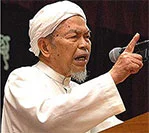THE death of Tuan Guru Datuk Nik Abdul Aziz Nik Mat, Murshid’ul Am or spiritual leader and former chief minister of Kelantan, marks a significant landmark in Malaysian political history.
Along with Yusof Rawa, he was’ among the senior members of the so-called Ulama faction that deposed Asri Muda, president of the Pan-Malaysian Islamic Party (Pas), in 1982 and began the internal reform of the party turning it into Malaysia’s biggest and perhaps best organised opposition party.
Throughout the 1990s, he was seen as the bedrock of Pas’ power among the Malay-Muslim electorate and the key factor that ensured the victory of Pas in Kelantan.
Despite several attempts by the ruling coalition to woo the Kelantan electorate with proposals for development, the Kelantanese voters opted for Pas throughout the 1990s and in the elections of 2004, 2008 and 2013.
Nik Aziz was also one of the prime movers of the Islamisation programme in the state, and played a key role in the development of the network of madrasah (religious schools) there, linking them to madrasah across the Muslim world. Since 1999, Pas has sought to reposition itself to the Malaysian electorate as an Islamist party that was colour-blind and transcended ethnic differences.
This was partly the result of the collaboration, between Yusof Rawa and Nik Aziz, who wished to project the Islamist party in clear and strictly-defined ideological terms as a party of Muslims first, and one that would promote a vision of an Islamic state where ethnic distinctions were secondary.
In keeping with this project, he also promoted the collaboration between traditional ulama (religious scholars) and professional university-trained technocrats, which was dubbed the ulama-professional coalition, since the 1990s.
The shift towards a more ideological register was partly due to the pragmatic understanding that no party could govern Malaysia alone, and that for Pas to become a national party, it would have to form a coalition with other parties such as the Chinese-based DAP and the multiracial PKR, which was formed after the 1999 political crisis.
Over the past two decades, Nik Aziz was seen as the main pillar of support of the pragmatic faction within the party’s leadership, sometimes dubbed as the reformists or the Erdogan wing.
Since the 2008 General Election, the pragmatic wing of Pas has opted for closer co-operation with DAP and PKR in the opposition Pakatan coalition, despite the growing chorus of concern and disapproval among some of the factions within Pas.
This other faction has argued that by virtue of being in such a coalition the party had diluted its Islamist ideology and character.
Several attempts were made to challenge and weaken the opposition coalition, both within and from outside the component parties.
But Nik Aziz was steadfast in his commitment to the opposition coalition and argued that Pas would eventually come to power on its own terms, rather than join the ruling BN coalition.
Nik Aziz’s death raises several questions about the future of Pas and its standing in the opposition pakatan coalition: firstly, with him gone, it is unclear to what extent the reformist-modernist Erdogan faction can hold back the growing demands for Pas to break away from the opposition coalition, and to join other Malay-Muslim parties to uphold the goal of Malay-Muslim dominance in the country.
Secondly, the death of Nik Aziz means that the pivotal post of spiritual leader of the party will need to be filled by another Pas leader of equal standing and prominence.
The successor will in turn be in the important position ‘of being able to determine the outlook and orientation of the party.
Datuk Nik Abdul Aziz Nik Mat was steadfast in his commitment to the opposition
Since the 1980s, Nik Aziz was perhaps one of the most visible faces of Pas in the country and beyond.
For Pas’ allies in the global network of Islamist parties such as the Ikhwan’ul Muslimin, the Jama’at-e Islami and the new reformist Islamist parties in Turkey and Tunisia, he was one of the few Malaysian Islamist leaders of international standing and importance who had put Pas on the global map of political Islam.
Filling the shoes of Nik Aziz will not be an easy task for any of the leaders of the party.
The political implications of his death are also of concern to analysts and observers of Malaysian politics.
Coming as it does at a time when a range of non-governmental organisations, social movements and lobby groups have been calling for Malay-Muslim unity, the death of Nik Aziz will have profound consequences for Pas’ standing in the opposition alliance, and Malaysian politics.
Article by Farish Noor which appeared in New Straits Times, Feb. 18, 2015.





